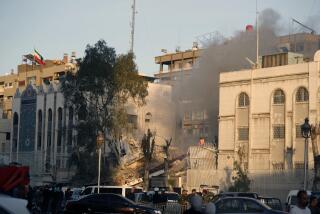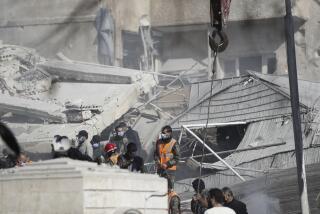Turkey breaks with Syria over crackdown
Turkey on Thursday signaled a diplomatic shift to further distance itself from longtime ally Syria, welcoming defecting Syrian officers and announcing plans to deliver relief assistance to beleaguered pro-democracy protesters across the border.
The shift against Damascus, where President Bashar Assad has undertaken a bloody crackdown against peaceful demonstrators, comes after months of waffling and wavering over its stance on uprisings that have shaken or brought down autocratic longtime leaders across the region. Turkey endorsed the largely peaceful revolution in Egypt, for example, but pleaded for political reforms rather than the ouster of heads of state in others, especially ones where it has business interests, such as Syria or Libya.
“Like any other country, Turkey had double standards on the ‘Arab Spring,’” said Ozgur Unluhisarcikli, an Ankara-based analyst for the German Marshall Fund, a think tank. “But recently Turkey is fine-tuning its policy. This new policy is based on the demands of the people instead of the priorities of the regimes.”
Foreign Minister Ahmet Davutoglu, architect of Turkey’s “zero problems with neighbors” policy that prioritized good relations with Middle East governments, all but announced the abandonment of that guideline to reporters Thursday after a meeting with Turkey’s ambassadors and national security team in the capital, Ankara.
“Our region demands a serious and urgent reform process,” Davutoglu told reporters, according to the semiofficial Anatolia news agency. “Regional people’s demands are normal, rightful and legitimate. Meeting those demands will make our region a more stable, more democratic and more prosperous region. We are ready to do our utmost to help our region complete this transition process in a healthy way.”
Davutoglu said relief workers would cross the Syrian border to bring supplies to thousands of hungry people displaced by Assad’s crackdown. Unnamed officials in Ankara were quoted as saying the Turkish military was considering establishing a humanitarian “buffer zone” inside Syria.
And as Syrian troops and pro-government shabiha militiamen in the northwestern province of Idlib on Thursday widened their deadly campaign to root out dissent in the region close to Turkey, a Syrian lieutenant colonel and four soldiers deserting their posts took shelter in Turkey, Anatolia reported.
The moves against Damascus, after escalating rhetoric against Assad’s actions, are cooling once-warming ties with Syria ally Iran.
Tehran has begun to criticize Turkey, a growing power in the Middle East and Muslim world, for adopting a “Zionist” foreign policy regarding Syria. Iranian commentators had hoped Turkish Prime Minister Recep Tayyip Erdogan would soften his increasingly boisterous critiques of Assad’s regime after major elections Sunday. Instead, bolstered by election victories, a healthy economy and widespread popularity in the Arab world, Erdogan appears to have doubled down on his bet against Assad’s regime.
“One thing for sure is that the Syrian troubles are forcing the Turks to reconsider the tenets of their foreign policy,” said Henri J. Barkey, a Turkey specialist at Lehigh University and the Carnegie Endowment for International Peace.
Political calculations played a role in the change. Turkey is worried that a refugee crisis could unsettle the country. Another concern is that militant Kurdish groups may find refuge in Syria, as they did in the 1990s. In recent weeks, thousands of Syrian civilians have fled to Turkey and Lebanon to escape Syrian security forces.
Many say it was the harrowing images and horror stories of Syrian refugees that changed political calculations for Erdogan, who considers himself a world figure embracing the oppressed. On Thursday, Syrian activists issued a report and a video that they said documented the use of explosive bullets by security officials during a protest this month in Latakia in which 20 people were killed, including a 15-year-old.
Meanwhile, there were few signs that Syria was taking steps to stop the flow of refugees. Syrian troops continued to blaze through areas of the country’s restive northwest, where they have burned crops and shelled homes, rounding up and detaining hundreds of male residents older than 16, according to human rights activists.
Turkish journalists allowed to join Syrian troops in the besieged northern community of Jisr Shughur described a ghost town that smelled of blood.
“At the end of the day Erdogan thinks about people going to bed hungry and children losing their fathers and he feels it,” said Asli Aydintasbas, a columnist at the newspaper Milliyet and a frequent critic of the prime minister. “He’s a man of emotion.”
Surprising many, Turkey has also even spoken of the possibility of foreign military intervention and warned Assad that Ankara might endorse United Nations Security Council action against his regime.
“We are approaching a situation where international intervention is not totally out of the question,” said Unluhisarcikli, of the German Marshall Fund. “Turkey doesn’t want to be caught by surprise and wants to be prepared for such a possibility.”
Erdogan, analysts say, is enraged that Assad didn’t heed his advice to curtail violence and embark on reforms, humiliated that for years he has been talking up the Syrian president to partners in the West as the man to reform Syria.
“Erdogan is [angry] at Bashar for not listening to him, the big brother,” Turkey specialist Barkey said. “There is a danger for Bashar that Erdogan may personalize this.”
Special correspondent Alexandra Sandels in Beirut contributed to this report.
More to Read
Start your day right
Sign up for Essential California for news, features and recommendations from the L.A. Times and beyond in your inbox six days a week.
You may occasionally receive promotional content from the Los Angeles Times.





